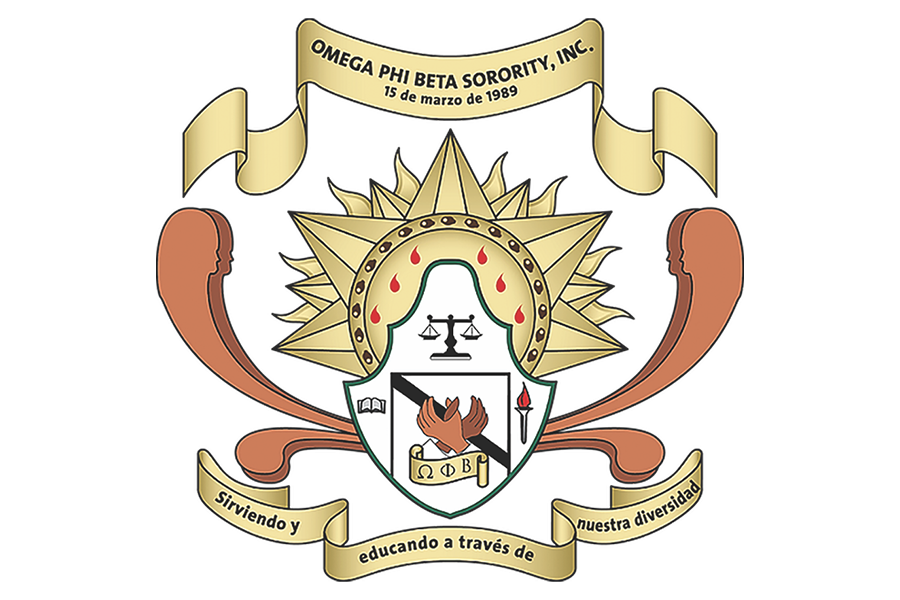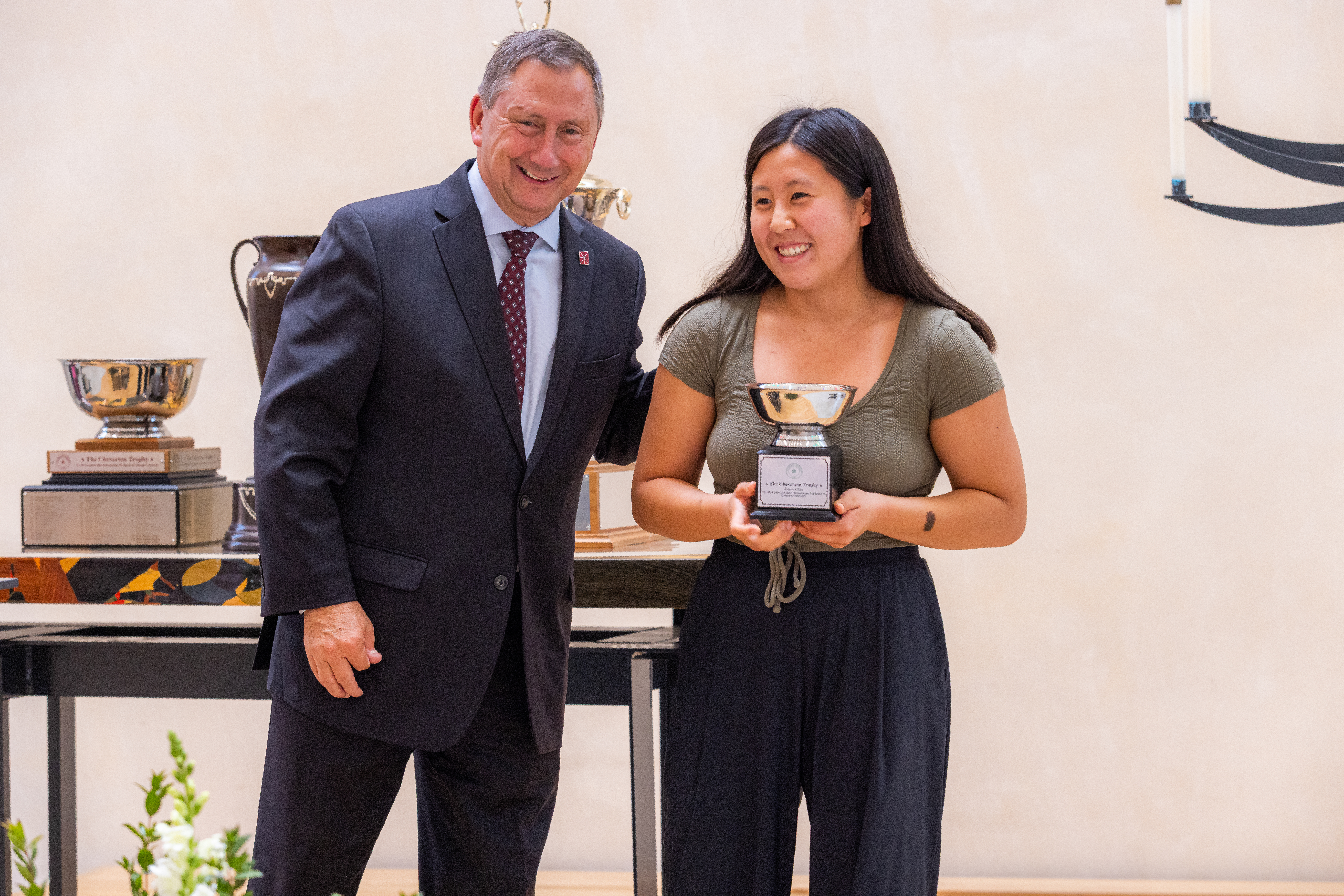 First-generation students Natalia Trejo, Aizzy Portillo and Cintya Felix can add something else they have in common to their time at Chapman University: sisters in the university’s first multicultural Greek organization.
First-generation students Natalia Trejo, Aizzy Portillo and Cintya Felix can add something else they have in common to their time at Chapman University: sisters in the university’s first multicultural Greek organization.
Felix ’26 encountered Omega Phi Beta Sorority, Incorporated at a student organization fair during her first year.
“I truly never saw myself pursuing Greek life — I thought they were not meant for me,” says Felix, who was busy with classes, student government and work. “It turned out that OPB changed my opinion and shifted my perspective and now here I am as the vice president.”
She, Trejo and Portillo joined Omega Phi Beta in October 2023. The Latina-oriented sorority focuses on the “development of collegiate and professional women through sisterhood, diversity, leadership, service and academic excellence.”
Finding Representation in Greek Life
Before joining Omega Phi Beta, Portillo ’24 says she wasn’t very involved on campus and didn’t know where to find people who shared her identity. Her perception of Greek life was “like what you see in movies, with the stereotypical party and social life.”
She learned that multicultural Greek organizations enable students to connect with themselves and others. They offer a place where students can experience sorority and fraternity life with people from diverse cultural backgrounds.
“High school seniors look for a university where their identities will be represented,” says Portillo, a political science major and the sorority’s programming chair and “herstorian.” “Greek life is a good place to find that representation.”
Similarly, Felix says that representation in Omega Phi Beta’s network was “instrumental” for her, particularly its connection with attorney Daisy Figueroa, a member of the sorority’s regional expansion committee.
“My grandma only went up to the second grade in elementary school,” says Felix, a political science and Spanish double major who immigrated from Mexico five years ago. “My mom only finished middle school. So when I met Daisy at the student involvement fair I was like, ‘Wow, a Latina lawyer.’ I knew that’s a path that’s available for me.”
Trejo ’24, the sorority’s president and a sociology and business administration double major, says Omega Phi Beta’s alumni network gives her professional role models that first-generation students often lack.
“It’s not only about getting Latinx students into college, it’s about getting Latinx students through college and setting them up for a successful career,” she says.
Making History
For Trejo, joining Omega Phi Beta was a once-in-a-lifetime opportunity.
“A lot of people can’t say that they’re chartering members of their chapters or of their collectives,” she says. “It’s a very big deal for Chapman’s history.”
Reg Chhen Stewart, Chapman’s vice president of diversity, equity and inclusion, says Chapman is a perfect fit for multicultural Greek organizations.
“We have highly motivated academic achievers who are dedicated to supporting their communities,” he says. “We are thrilled that Omega Phi Beta is the first of what we hope to be many organizations that will consider establishing chapters at Chapman.”
Omega Phi Beta has chapters around the country, mostly on the East Coast. There are more than 20 multicultural and Black Greek organizations on campuses across the U.S.
Jaclyn Dreschler, who supports and manages Greek life and student organizations as associate director of student engagement, says Chapman worked for years to bring culturally-based or multicultural Greek organizations to campus.
“A sorority, and in particular the first culturally-based sorority at Chapman, is an amazing accomplishment for the founding members,” Dreschler says.
Growing Representation on Campus
 In addition to the excitement of starting Omega Phi Beta, the three chartering members look forward to more diverse Greek organizations coming to Chapman. The new sorority has already received a flood of support from Latinx groups on campus and members and alumni of multicultural Greek organizations around Southern California.
In addition to the excitement of starting Omega Phi Beta, the three chartering members look forward to more diverse Greek organizations coming to Chapman. The new sorority has already received a flood of support from Latinx groups on campus and members and alumni of multicultural Greek organizations around Southern California.
“It’s an inspiring time for our community as we have our first multicultural sorority,” says Gabriela Castaneda, director for Hispanic/Latinx achievement at Chapman. “We are excited to see Omega Phi Beta grow.”
The sorority’s members participated in events during the fall 2023 semester that dealt with critical DEI subjects like the experiences of first-generation college students, Native American Heritage Month, literacy in underrepresented communities and environmental awareness. Currently, the sorority is planning its own events for the spring 2024 semester.
Omega Phi Beta’s inception reflects Chapman’s plan to foster more diversity, equity and inclusion at the university. One of the university’s strategic goals is to offer programs that cultivate a welcoming campus.
As Chapman has improved representation on campus, it’s getting closer to earning a Hispanic-Serving Institution designation, which is given to universities where at least 25% of undergraduate students are Hispanic. With the university’s commitment to equity and increasing access, underserved community members and students with diverse backgrounds will be more successful in their educational journeys at Chapman.
“My family is low income, so attending university is improving myself to become successful,” Felix says. “I think joining Omega Phi Beta has been key for my success, for my character development and for my journey.”




